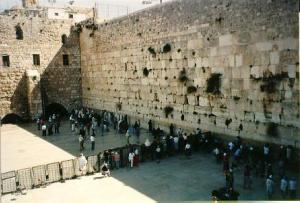
The Jerusalem Temple, remains of the western wall (
Reference: Mark 13:14-37
Question:
In my understanding, Jesus is taking about the end times in Mark 13:14-37. So how can you explain that Jesus is saying that “this generation” will experience the end times (referring to Mark 13:30) and now almost 2000 years after that this generation is gone and Jesus didn’t come back yet?
Answer:
The fact that Jesus is speaking of the end times is not in doubt, the question is, “what are the ‘end times’?” Often, when we think of the end times we think of the last days of the earth when Christians will be ‘raptured’ up to God and the rest will be ‘left behind’ (you know what I’m talking about). The reality is that we are living in the end times right now and have been since the time of Jesus. Jesus’ on this earth arrival ushered in the beginning of the end times. The end times is the coming of the Kingdom of God and the ousting-out of the kingdom of Satan. The Kingdom of God is the reign and rule of God through which the perfection of his creation will be reinstated on this earth, not as something new but as something RE-newed. That which is broken will be restored, that which is sick will be healed, that which is lost will be redeemed, etc.
All this to say, the end times is not something we wait for and fret about, we are living in the end times now and we are called to be an active part of bringing God’s Kingdom to this earth. What we wait for and what we long for, as believers, is the return of Jesus when he will bring this cosmic redemption to completion. In the meantime, we live in the tension of the already-but-not-yet nature of this age. In other words, Jesus has ALREADY ushered in his Kingdom, but NOT YET has it come in its fullness (see post on present suffering).
To the question at hand, yes Jesus is talking about end times, but he is not talking about some far-distant thing that will happen just before he returns. The realities that he mentions are end-times realities, but he is actually being much more specific, talking about something much closer to his contemporaries. Namely, the destruction of the Jerusalem Temple. See Post on Matthew 16:28.
This entire passage of Mark 13:1-31 is based around Jesus’ statement to his disciples about the temple in Mark 13:2, “Do you see all these great buildings?” replied Jesus. “Not one stone here will be left on another; every one will be thrown down.” It is not insignificant that the context of this passage is a discussion about the Temple in Jerusalem. Jesus is looking toward the future destruction of the Temple (a historical event that took place in 70A.D.) and telling his disciples both what they can expect and how they should live their lives.
What the disciples can expect:
False Messiahs 13:6,22
Wars 13:6-8
Earthquakes 13:8
Famines 13:8
Persecution and trials 13:9,11,13
Dissension within families 13:12
The Abomination that Causes Desolation 13:14
Sun and moon darkened, stars fall from sky – 13:24-25
Son of man coming in power and glory – 13:26-27
What the disciples should be doing:
Watching 13:5
Don’t be alarmed 13:7
Be on guard 13:9,23
Preach the Gospel to All Nations 13:10
Don’t worry 13:11
Stand Firm – 13:13
Pray 13:18
The message about what followers of Jesus should be doing is clear… “Be ready!” But the words about what we can expect seem cryptic at best. Taken at face value it sounds like we should be looking for a time when the world is cosmically falling apart. I can’t tell you how many times I’ve heard people say that the end times must be getting close because we have an earthquake or hurricane. The end times are not getting close, we are living in the end times right now and we have been for 2000 years. We should be living our lives in a state of constant readiness and constant vigilance in spreading the good news about Jesus.
Jesus here, is addressing something much more specific within the end times. He is answering the disciples question about the temple. Believe it or not, all of the events that Jesus speaks about in Mark 13 are events that can be linked to the destruction of the temple in 70A.D, or that happened before or near that event. I will briefly look at those listed above one by one…
False Messiahs – This was already an issue in first century Palestine when Jesus arrived on the scene. False messiahs were popping up all over the place. This was true before Jesus and after Jesus, and is not something reserved for the ‘end of all things’. Thus, it would not have been strange for there to have been false prophets and false messiahs leading up to the destruction of the Temple.
Wars – The Jerusalem Temple was torn down in the Jewish War with the Romans in 70 A.D. And we have seen many wars since.
Earthquakes – On the day that Jesus died, there was an earthquake that had significant implications on the Temple and its future destruction. In the moment of Jesus’ death the veil of the temple was torn from top to bottom signifying the end of the age of temple worship which was soon to come (Matthew 27:51).
Famines – The great ancient historian Flavius Josephus records the Jerusalem famine saying “Now of those perished by famine in the city, the number was prodigious, and the miseries they underwent were unspeakable” (Josephus 192).
The Abomination that Causes Desolation – Whenever you see footnotes in your bible that cross reference other parts of the bible, go to that address and figure out what it means. Jesus knew scripture inside and out and he used it to teach his disciples. These are words taken from Daniel. This particular passage in Daniel is speaking about desecration of the Temple. Thus Jesus, again is referring to the Temple and what will happen to it, namely that ‘no stone will be left on another’ (Mark 13:2).
The Gospel must be preached to all nations – This happened in Acts chapter 2… “There were staying in Jerusalem God fearing Jews from every nation under heaven.” (Acts 2:5). It is this group of people from every nation who heard the first sermon given by Peter. While it is likely that not every nation under heaven was really there, we must take into account the figurative nature of the statement, and the fact that all known nations may have been represented. Likewise, in Mark this may just as likely be a figurative statement about the need to preach the gospel to every nation before the Temple was destroyed. Though we can be certain that it is the will of God that the Gospel be shared with every nation (even the one’s we don’t know about).
Persecution and Trials – One need only read the book of Acts to see the kinds of trials that Jesus’ followers went through in the years leading up to the destruction of the temple (Acts 8:1)
Sun and Moon Darkened – This is not a literal description of the universe falling apart, this is an allusion to Isaiah 13:10 and Isaiah 34:4, both of which use the same language to describe seismic shifts in the political landscape of Isaiah’s time, namely the fall of the Babylonian empire. Jesus uses the same figurative language to describe the fall of Jerusalem (that is Jesus being ironic).
Son of Man coming in Glory – Our classic view of the end times is that the ‘elect’ people will get to see Jesus floating down on the clouds. I won’t say that that is not true, but I will say that this statement by Jesus is not about the manner of Jesus’ arrival when he returns. Rather, it is about the shift that is taking place in the world as Jesus ushers in the Kingdom of God. The destruction of the Temple would be another powerful symbol that the Kingdom of God has arrived and the age of the Temple is over. Authority is shifting from the Temple to the Christ.
When Jesus ends his teaching to the disciples by saying, “THIS GENERATION will not pass away” (Mark 13:30), he is indeed referring to his contemporaries, the ones who could hear him speaking these words. They would soon experience the tragedy of seeing the Temple destroyed, some 40 years after his resurrection. However, this did not mean that Jesus would return immediately and the world would come to and end, rather, it was a powerful sign that the age of the Kingdom of God was being realized.
Cited
Flavius. Josephus and William Whiston, The Works of Josephus : Complete and Unabridged (Peabody: Hendrickson, 1996, c1987), Wars 6.192









